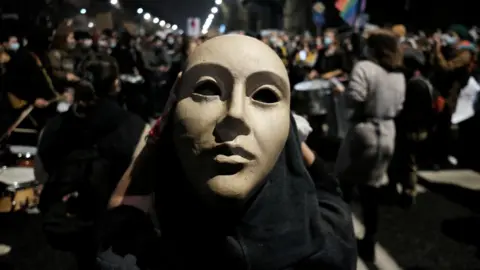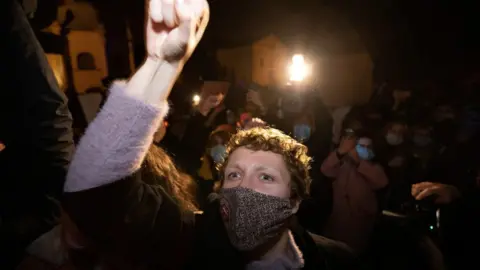Poland abortion ruling: Protests spread across the country
Thousands of women are protesting against Poland's new abortion laws in cities across the country.
A court ruling on Thursday banned almost all abortions - with exceptions only for cases of rape, incest, or where the mother's health is at risk.
Abortions carried out when the foetus is malformed, which accounted for 98% of legal terminations last year, have now been outlawed.
Poland already had some of the EU's strictest abortion laws.
Fewer than 2,000 legal terminations are carried out each year. But women's groups estimate that up to 200,000 abortions are either performed illegally, or abroad.
Protests were held in Poznan, Warsaw, Wroclaw and Krakow, among other cities, on Friday, footage from broadcaster TVN showed.
It marked the second night of protests in the country, where strict measures against coronavirus ban gatherings of more than 10 people in most major cities.
 Reuters
ReutersIn the early hours of Friday morning, protesters clashed with riot police outside the Warsaw home of Deputy Prime Minister Jaroslaw Kaczynski, who heads the governing Law and Justice (PiS) party. Police said officers used pepper spray and physical force when some protesters threw stones and tried to push through the cordon around the house.
Protesters gathered near his home again on Friday night, carrying signs with messages such as "This is war" and "You have blood on your hands".
Police in riot gear blocked them from reaching the house. Some urged protesters through loudspeakers to obey restrictions on public gatherings, Reuters news agency reports.
Elsewhere in the country, demonstrators gathered in main squares, near churches and outside PiS buildings.
Magda, a 34-year-old protester in the northern city of Gdynia, told TVN: "Women are not respected in this country. No-one is listening to us."
"It's a disgrace from the Polish state towards half of the population, women. We'll never forget it," Krystyna Kacpura, head of the Federation for Women and Family Planning, told AFP news agency.
Why has the law changed?
The ruling on Thursday was delivered by the Polish constitutional court. It said legislation allowing for the abortion of malformed foetuses was "incompatible" with the constitution.
It came after a legal challenge was launched by MPs from the governing nationalist PiS last year.
A majority of the court's judges were nominated by the same party.
Archbishop Stanislaw Gadecki, the head of the Polish Episcopal Conference, and the Polish presidency both hailed the ruling.
However, it was widely criticised by rights groups both inside and outside the country.
 Reuters
ReutersAlthough Poland is one of Europe's most staunchly Roman Catholic countries, opinion polls suggest there is a clear majority against making the abortion law stricter, the BBC's Adam Easton in Warsaw reports.
Dunja Mijatovic, the Council of Europe's commissioner for human rights, said it was a "sad day for women's rights".
Former Polish Prime Minister Donald Tusk - who now leads the centre-right European People's Party grouping after presiding over the European Council - also criticised the judgement.
"Throwing the topic of abortion and a ruling by a pseudo-court into the middle of a raging pandemic is more than cynical," he tweeted.

